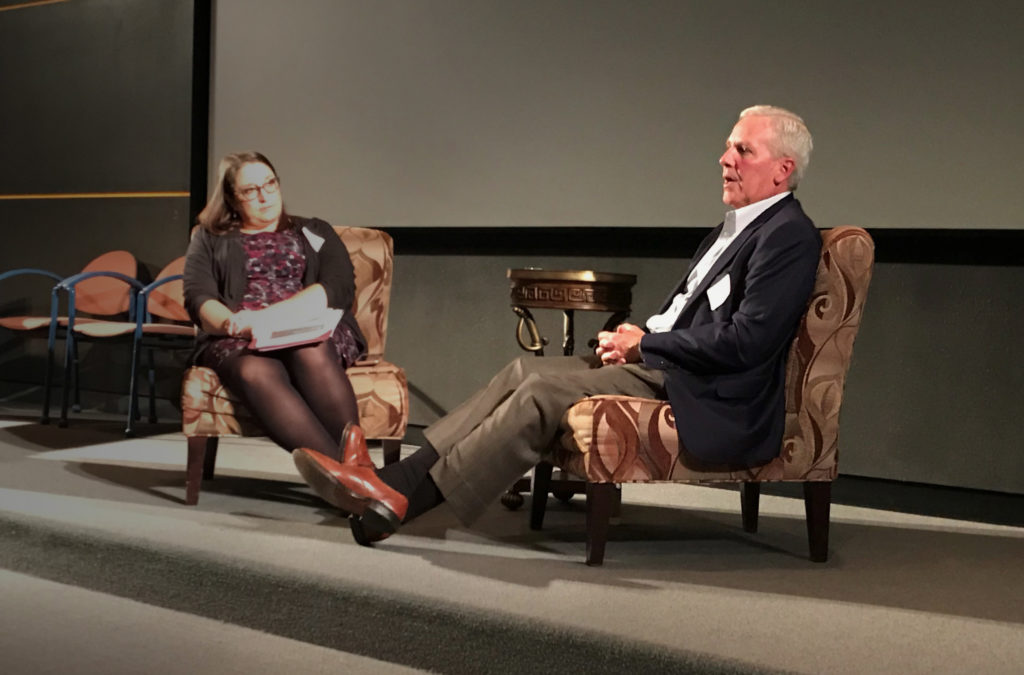Building a successful career in the biotechnology industry is really just a series of transitions from one role to another. But the devil is in the details—when to make a change, how to create opportunities and who can be your champion as you pivot. So how do you navigate these factors to keep your career goals on course?
Written by: Darcia Schweitzer, PRomega
I recently attended a symposium (presented by the University of Wisconsin Master of Science in Biotechnology Program, of which I’m an alum) that addressed this topic through the lens of one individual with a storied career in the industry. Bob Weiland currently serves on the Board of Directors for CymaBay Therapeutics. He has held various roles, from sales and marketing to operations and strategy, within large, established companies (Abbot, Baxter, Takeda) and smaller ones (Pacira Pharmacueticals). He drew on this wide-ranging experience to provide advice to professionals at all career stages.

Bob began the talk by declaring that there will be points in your career when you reach a “hard spot” and will need to transition, whether to a new role, company or even industry, to meet your career goals. He suggested a good starting point is simply to be thinking about making a change. But in the same breath he emphasized, “What are you doing about it?” He identified four distinct actions that you can take to ensure role changes and career transitions support your professional growth and development.
Make A Plan
Weiland stressed the importance of planning your exit or transition. It is important to take your time and be strategic when determining if it is time to move on from your current position and identify the next opportunity you want to pursue. It can take months or even years to develop your plan—Bob once took a year and a half to identify and prepare for a new opportunity once he had decided it was time to move from his position as VP at The Medicines Company.
Some steps you can take when planning include updating your resume and then customizing it into a few different versions to highlight different types of experience for different roles you’re interested in (project manager vs supervisor vs marketing). You can also start probing your network for someone who can connect you with the hiring manager for a position or company you are interested in.
Be Open to Opportunity
Make sure to be open to any opportunities that have the potential to change your career trajectory. Be willing to stretch from your current role and take on roles you’re not ready for. This will require that you have faith in your ability to learn and grow to fit that role. Bob likens it to bringing home a newborn from the hospital—you can’t really be ready for some things until you do them. By the same token, you can prepare by working to gain knowledge through reading, videos or mentors.
You also need to be open to bigger changes like joining a new company, moving to a new geographic location or even taking a professional risk, like joining a start-up. While staying with a large, established company offers lots of opportunities to grow and rise through the ranks, you won’t get there unless you’re on the lookout for these opportunities and are willing to step up to new challenges. Small start-ups can provide a faster path to leadership roles but tend to be resource-constrained and, while not devoid of opportunities, will have fewer prospects when looking to stretch beyond your current role.
Deciding whether to stay at the company you’ve already invested a lot of time and energy into and feels comfortable or take a leap in the unknown and join a new one can be difficult. Bob says if you’re smart, work hard and make sure your performance is recognized, staying with the same company is a good decision as long as you can see a path for growth. Identify what you want and what you need to do; if your current company can’t support those goals, it’s time to leave. It’s important not to let loyalty hold you back. The decision needs to be personal and Bob advises that you “don’t stay because of somebody else.”
Always Be Curious
Maintaining intellectual curiosity is another way to prevent a stunted career. Bob suggests subscribing to email newsletters relevant to your current role, career goals and industry. Then staying current becomes part of your daily routine as you’re going through your inbox. It’s also helpful to stay curious about what people outside of your department are doing.
Perhaps you’re looking to transition from a technical role to a marketing role. You can reach out to others within you company who work in a different part of the business. Instead of asking that person to help you with something, offer to do something for them (like help them understand the science!) or ask how you can contribute to a project you’re interested in.
While acquiring the right knowledge and skill set for a new position is important, Weiland said it is not a deal-breaker. It’s much more valuable if a candidate can demonstrate their ability to learn and grow into a role. This capacity for growth is crucial because often a hiring manager isn’t just looking to fill the stated role, they are also thinking of the future and what other roles a candidate has the potential to step into beyond the immediate position.
Network (Every. Single. Day.)
Relying on your professional network gets more important the further you progress in your career. Weiland says the act of networking is essential and something you should do so often it becomes second nature. While it is natural to feel like you don’t have the personality to network effectively, Bob believes that networking is “more science than social skill.”
Networking isn’t going to pay off if you just go through the motions and show up at a job fair or networking cocktail hour. Bob suggests the real factor for success is approaching each networking opportunity by establishing a clear purpose. If you’re looking to transition to a new role, sharing your strategy for career development with someone and asking for their opinion is an easy way to start a conversation. Even better, get an introduction from someone who is already part of your network or at least mention that a mutual contact suggested you talk to them about your career goals.
Weiland ends each networking opportunity by asking for a few more contacts that might be helpful (he likened it to a benevolent pyramid scheme), which will ensure you continue to strengthen your network. It is also important to nurture your network in order to keep your name top of mind should the right opportunity present itself to one of your professional connections. For example, Bob regularly shares book titles or articles with contacts he thinks would find them interesting or relevant—this small investment of time will mean a lot and helps to keep you imprinted in their memory.
Above all else, Weiland emphasized the importance of being genuine. Playing office politics may get you somewhere, but generally it won’t get you to the top. He advised that you must “be politically aware, but not political.” Eventually, people will see you for who you are and you want to make sure you’ve represented an accurate picture.
While I wasn’t surprised by any of the advice Bob offered, I was impressed by the concrete examples he provided. I now have a few more tools in my networking belt that I’m actually excited to use—which says a lot coming from an introvert that starts to have chest pains at the mention of networking.
WOULD YOU LIKE TO SEE MORE ARTICLES LIKE THIS? SUBSCRIBE TO THE ISHI BLOG BELOW!
SUBSCRIBE NOW!


